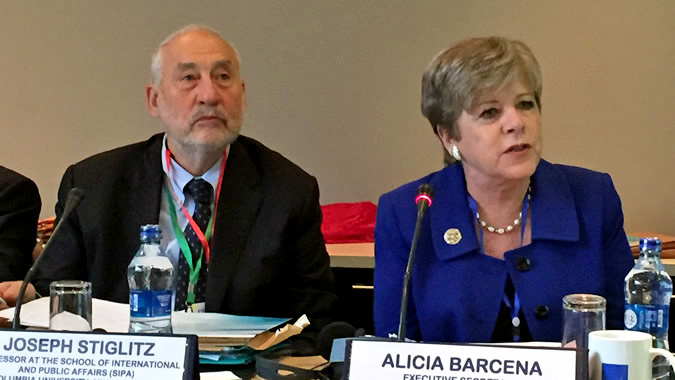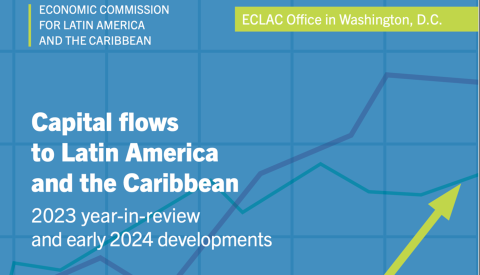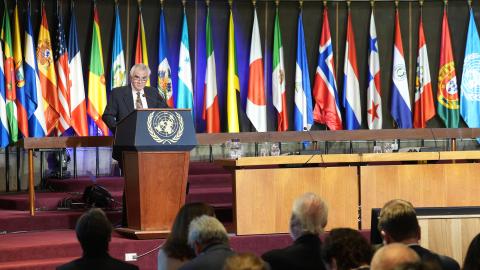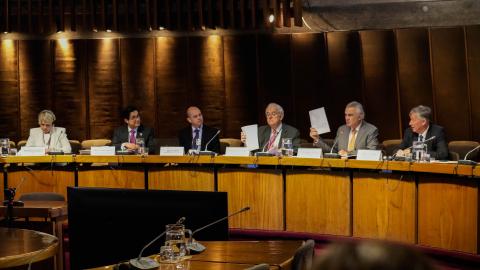News
Ministers and senior officials from Latin America and the Caribbean, along with Nobel Prize-winning economist Joseph Stiglitz and the Executive Secretary of the Economic Commission for Latin America and the Caribbean (ECLAC), Alicia Bárcena, agreed today during an event held in Addis Ababa on the need for global collective action to finance sustainable and inclusive development, within a framework such as that of the United Nations, where all voices may be heard.
This debate, dedicated to analyzing the domestic mobilization of resources and international financial governance from the perspective of middle-income countries and small island developing states, was organized by ECLAC along with the Governments of Chile and Colombia. It was held on Tuesday, July 14 at a hotel in the Ethiopian capital in the framework of the Third International Conference on Financing for Development, which is taking place in that city from July 13 to July 16.
“We need a global accord discussed in the framework of an international institution where everyone can be heard, such as the United Nations,” said Joseph Stiglitz, who praised the ECLAC document summing up the ten key messages of the regional consultation on this issue that took place last March in Santiago, Chile with the participation of Latin American and Caribbean countries.
With regard to financing, the winner of the Nobel Prize in Economy indicated that the problem is not a lack of liquidity but rather that it is not being channeled towards investment. He added that developed countries often do not meet their commitments for Official Development Assistance (ODA) and sometimes try to prevent developing States from passing regulations on taxation mechanisms of Foreign Direct Investment (FDI). Regarding the latter, he indicated that it is not as stable as many people believe and is very concentrated in specific sectors and countries.
“We urgently need greater transparency, reciprocity and international cooperation in fiscal and tax areas,” to boost domestic resources mobilization, ECLAC’s Executive Secretary said. In that sense, Alicia Bárcena underscored the need to combat illicit flows generated from transnational and national companies’ tax evasion. According to Global Financial Integrity (2014), the illicit flows leaving Latin America surpass 150 billion dollars.
During the debate, participants also analyzed ECLAC’s proposal, presented by Alicia Bárcena, for international credit institutions to forgive the multilateral external public debt held by English-speaking Caribbean countries—which was largely taken on due to the natural disasters that have affected the area in the last twenty-five years. The resources that are released must feed a resilience fund to finance climate change mitigation and adaptation measures.
Peter Phillips, Jamaica’s Finance Minister, and Darcy Boyce, the Minister in the Office of the Prime Minister of Barbados, highlighted the fiscal limitations that English-speaking Caribbean countries face due to the external debt burden, the decline in tourism-related income, and the fall in FDI stemming.
“We need an international accord. We hope that in Addis Ababa we can launch a general framework for fiscal policies,” Peter Phillips said, while Darcy Boyce remarked: “This debate must be taken to the heart of the United Nations.”
Other participants in the debate included: Andrés Escobar, Deputy Minister of Finance of Colombia; Eduardo Trejos, Deputy Minister of Foreign Affairs and Worship of Costa Rica; Jeannette Sánchez, aide to Ecuador’s Vice Presidency; and Eduardo Gálvez, Director of the General Office for Multilateral and Global Matters at Chile’s Foreign Affairs Ministry.
In their remarks, they proposed diverse ideas and initiatives related to tax reforms to increase fiscal income, especially through taxes levied on the exploitation of natural resources, as well as with public-private alliances and with the collaboration of development banks—all of this with a focus on increasing investment in infrastructure, education and health in the region’s countries.



